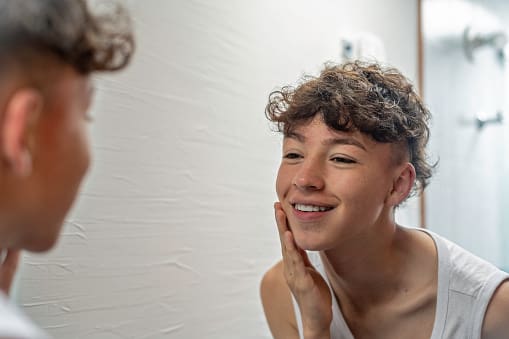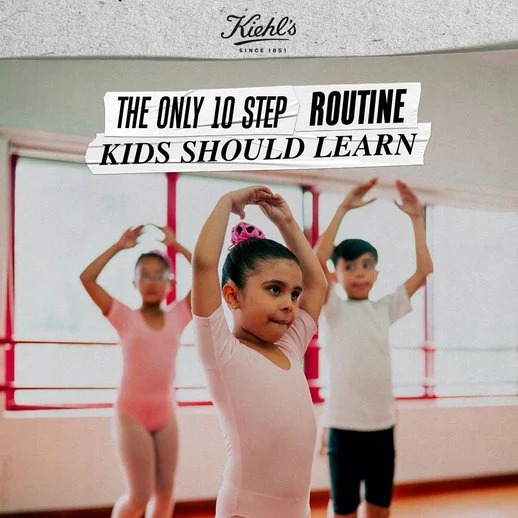Skin Savvy:
Teaching Preteens Skin Care Essentials


It has been widely reported that social media trends are shaping the beauty habits of preteens and teens. Digital platforms push content promoting the latest skin care products and routines from influencers. These viral trends, primarily on TikTok and Instagram, are driving preteens and teens to use anti-aging products intended for mature skin.
Finding the right skin care approach for preteens and teens can be challenging. CosmeticInfo’s mission is to provide clear, science-backed information to help empower preteens, teens and their caregivers in developing age-appropriate skin care routines and habits. The resources shared here highlight effective skin care practices that prioritize the health and well-being of preteens and teens helping them feel confident and informed in their skin care.
What Parents & Caregivers Need to Know
Helping Your Preteen Make Smart Skin Care Choices
Lifelong skin wellness: Start with a straightforward, age-appropriate skin care routine for your preteen to form the foundation for good skin care habits, including cleansing, moisturizing and protecting their skin from the sun. Highlight how starting these habits early can prevent skin problems in the future.
Simplicity and consistency are key: Encourage independence and responsibility by helping them create a consistent, easy-to-follow routine and develop discipline and an understanding of the value of caring for themselves at a young age.
Tailor their skin care routine: Discuss how skin types can affect their product choice. Teaching them how to identify their skin type by observing how their skin reacts after washing—whether it feels tight, greasy or comfortable can indicate their skin’s nature.
Shop smart for skin care products: Teach your preteen to read labels and identify beneficial ingredients. Encourage them to avoid products with alcoholAlcohols are a large class of important cosmetic ingredients but only ethanol needs to be denatured to prevent it from being redirected from cosmetic applications to alcoholic beverages. or unnecessary additives that can irritate young skin.
What Products Should Preteens and Teens Use?
Gentle Cleanser
Choose gentle and effective cleansers. Products containing mild surfactants—ingredients that help degrease and blend oils and fats and suspend soil so they can be washed away—and natural moisturizing ingredients like glycerin or ceramides.
Moisturizer
Look for lightweight formulations that hydrate and support the skin barrier without heavy oils or fragrances, which can irritate sensitive skin and make acne worse.
Sunscreen
Wear sunscreen every day. Make sure they use a broad-spectrum sunscreen that protects against the harmful effects of UVA and UVB rays and has a sun protection factor (SPF) of 30 or higher.
If your preteen has specific skin concerns, check with their doctor or a dermatologist for specific advice.
What Experts Want Preteens and Teens to Know
“[Preteens and teens] definitely don’t need to use retinol. If [preteens and teens] are having acne, then they should see their doctors or dermatologist and get it prescribed rather than go for an anti-aging serumThe fluid part of the blood that remains after blood cells, platelets, and fibrogen have been removed., which does have some retinol, but the original intent is not to treat acne, and it’s also in the wrong formulation to treat acne.”
“It is important to find a routine that is best for your individual needs and concerns and not just use the product that is trending on social media.”
“It’s not necessarily a bad thing to start a routine early when it’s the correct regimen for their skin.”
“The number one thing we stress is sunscreen. Kids should develop that habit early so that it becomes part of their normal daily routine.”
What Brands Want Preteens and Teens to Know
“We strongly believe that kids should be kids, and that children have absolutely no need to use anti-ageing skincare products. In fact, the only beauty products that children should use are those designed to provide basic hygiene, personal care, and sun protection benefits; in addition to managing any skin conditions, including eczema and acne, when required.”





Dove believes a 10-year old’s face should be a canvas for care-free fun, not anti-ageing products. Dove, alongside Dr Phillippa Diedrichs, Research Psychologist at the Centre of Appearance Research at the University of West England and body image expert certified dermatologist Dr.Marisa Garshick have created: The Gen A Anti-Ageing Talk’ a free resource on how to talk to young people about anti-ageing and beauty anxiety.
“When did 10-year-olds start worrying about wrinkles and getting older? It is time to speak up to highlight the absurdity and protect their self-esteem,” says Firdaous El Honsali, Global Vice President, Dove.”At Dove, we believe beauty should be a source of happiness, not anxiety. For two decades, we have taken action to build confidence and self-esteem for millions of girls. Today, our girls are anti-aging before they’ve even started to grow up and need us more than ever.”
@dove Girls as young as 10 are being influenced by skin care content. Together we can protect TheFaceOf10. Watch our ‘Gen A Anti-Aging Skin Care Talk’ for tips and advice.
♬ original sound – Dove Beauty & Personal Care
“First, I would say stay away from our more potent products that include acids and retinols—their skin does not need these ingredients quite yet.”
